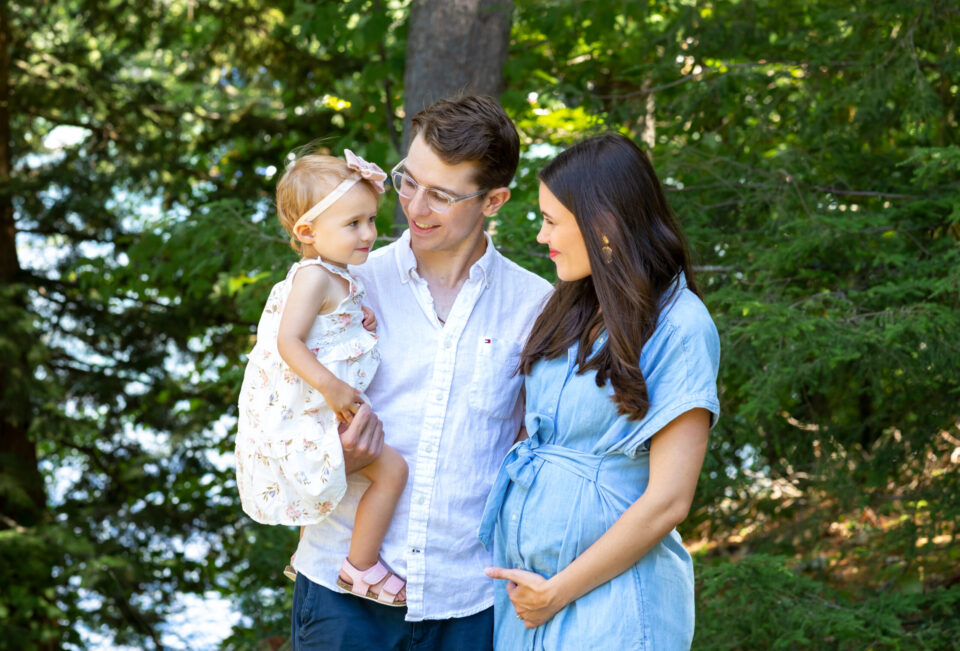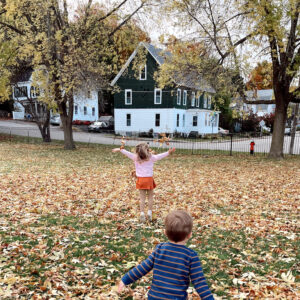I can very easily remember the days when I lived in Boston as a graduate student, sipping lattes in cute coffee shops, running alongside the Charles River and hopping on the T to get to class. Opportunities and adventures surprised me everywhere; just being surrounded by the activity of the city made you feel like you were a part of something grand. In many ways, my extroverted personality thrived from the liveliness of my environment.
It’s easy to look at my life then and now and identify a loss of freedom since my time is currently dictated by the needs of my children (both in and out of the womb). Personal freedom is a treasured asset these days, but when I say “personal freedom”, I mean the ability to do what we want, when we want. And when children become the cause of lost freedom, it’s easier to see them as a burden, or even a nuisance. As a mother, when I begin to think this way, my day can sometimes turn into a frustrated effort to try and recreate an experience of that pre-motherhood freedom, causing me to see my life as something less than what it was rather than a step forward.
But perspective is everything right? Once we start to look at something one way, it can seem true, even though the reality might just be the complete opposite. I have found that when I look at my day as a shared experience with my daughter, and an opportunity to grow together, then she is no longer a burden, but a companion and a pathway to my own development as a person.
I haven’t dived into it too much, but I am a big fan of Montessori education. Recently, I just finished The Absorbent Mind and I found that Maria Montessori encourages this same perspective of the child as “the greatest and most consoling of nature’s wonders” rather than a burden (The Absorbent Mind, 1967, p. 8). After reading Maria’s deeply insightful view of early childhood, I challenged myself to reflect on how welcoming my daughter into my life benefits us both in ways that invite more growth than even all the personal freedom in the world could offer.
Sharing Routines
One of the simplest ways I invite my daughter into my day is by sharing my routines with her. We get ready for the day together, eat meals at (usually) the same time, and work and rest in similar time frames. There are certainly routines I have that are just for me, but by letting her see that there are daily habits which we both must complete, she absorbs simple, but necessary cultural norms. By partaking in these with my daughter, I in turn grow in patience and self-lessness when I see how clearly my own habits shape hers. Granted, I can sometimes lose it when I let her sit on my lap while doing my makeup and she pokes her little finger into my favorite lipstick. There are moments when I need space, but when I remind myself how important it is to foster her innocent inquisitiveness, the smudged lipstick seems just a little less world-shattering.
Creating Meaningful Work
Another way in which I invite my daughter into my day is by creating and sharing work with her around the home. This is something Maria Montessori especially emphasized- the importance of providing the child with work that is relevant to their development. She distinguishes a child vs. adult view of work when she writes, “The child’s life is one in which work- the doing of one’s duty- begets joy and happiness. For adults, the daily round is more often depressing.” (The Absorbent Mind, 1967, p. 30). For the child, work is a process of self-creation whereby they learn new skills, discover the world and are surprised by simple encounters. It’s a true delight to see a young child absorbed in an activity or engrossed with a new discovery. Of course, as lovely as this sounds, in reality, it’s very much a process of trial and error to find what engages your child. Even as I write this, I’m laughing to myself because to get my 18-month-old to focus on anything for more than 30 seconds is a victory and patience is my most practiced virtue these days. She hasn’t yet learned how to fold the laundry or set the table, but she does enjoy wiping up little messes, putting away a few of her clothing items, and picking up her toys (when she wants to). My goal at this stage is to develop the habit of welcoming her help with simple tasks, even if it makes them take a bit longer, so that she can understand that her actions play a meaningful role in our family life. It’s less about the completion of the task and more about the invitation to be a part of something larger than herself.
Engaging in Conversation
While sharing so much of my life with my daughter, it’s become natural to communicate with her, though this is often difficult at her age. Much of our “conversation” comes from my own observation and intuitive understanding of her needs, though the older she grows, the more diverse and specific her needs become while her language ability is still limited. The best advice I can offer in this respect is that by communicating as clearly, specifically, and often as I can, the more language skills she can witness and put into practice. Language development is a truly amazing feat on the part of the child, which Maria Montessori also highlights: “The child has other powers than ours, and the creation he achieves is no small one; it is everything. Not only does he create his language, but he shapes the organs that enable him to frame the words. He has to make the physical basis of every moment, all the elements of our intellect, everything the human being is blessed with” (The Absorbent Mind, 1967, p.23) Reflecting on this, I find it easier to have more patience with my daughter when she is trying to communicate because she must work so hard to do so. How incredible it is that young children learn to speak and understand so much through mere absorption of their surroundings!
Learning how to welcome my daughter into my life is a constant journey of growth as we both develop alongside one another and in relationship as mother and daughter. I know this will change even more as our family prepares to welcome another child. Honestly, all these habits will probably be flipped on their head until we adjust, but what is life without constant growth? My hope is to always view the work of motherhood as an opportunity to share my life with my children and learn from them as they learn from me. In reflecting on the role of parents, Maria writes, “So we see there are two kinds of life, and the adult is privileged to share in both; in one, as parent, in the other as a member of society. The better of the two is that with children, for nearness to them brings out our best side.” (The Absorbent Mind, 1967, p. 31). I wholeheartedly agree that parenthood, while a difficult undertaking, if understood as the marvelous vocation that it is, frees us to become the best version of ourselves.




